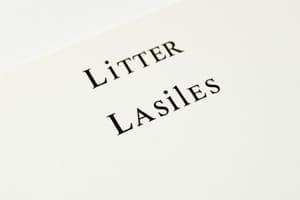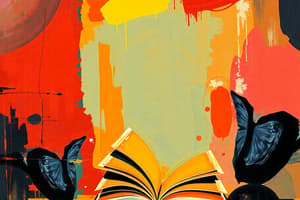Podcast
Questions and Answers
What is the primary focus of the English A subject area?
What is the primary focus of the English A subject area?
- Historical documentation and writing
- Literary analysis, critical reading, and effective communication (correct)
- Mathematical problem-solving techniques
- Scientific analysis and critical thinking
Which literary movement is characterized by a focus on emotion and nature?
Which literary movement is characterized by a focus on emotion and nature?
- Realism
- Romanticism (correct)
- Post-modernism
- Modernism
Which skill involves formulating reasoned statements supported by evidence from texts?
Which skill involves formulating reasoned statements supported by evidence from texts?
- Effective communication
- Argumentation (correct)
- Critical reading
- Interpretation
What does 'evaluation' refer to in literary analysis?
What does 'evaluation' refer to in literary analysis?
What is a key characteristic of literary devices?
What is a key characteristic of literary devices?
Which of the following is NOT typically assessed through examinations in English A?
Which of the following is NOT typically assessed through examinations in English A?
Which aspect of literary analysis requires a deeper understanding beyond superficial reading?
Which aspect of literary analysis requires a deeper understanding beyond superficial reading?
Which framework for understanding literature includes perspectives like feminism and Marxism?
Which framework for understanding literature includes perspectives like feminism and Marxism?
Flashcards
Literary Devices
Literary Devices
Techniques used in writing to create meaning and effect.
Literary Movements
Literary Movements
Groups of writers with similar writing styles, themes, and ideas.
Critical Theory
Critical Theory
Different ways of looking at literature and its meaning.
Interpretation
Interpretation
Signup and view all the flashcards
Critical Reading
Critical Reading
Signup and view all the flashcards
Analysis
Analysis
Signup and view all the flashcards
Argumentation
Argumentation
Signup and view all the flashcards
Effective Communication (Writing)
Effective Communication (Writing)
Signup and view all the flashcards
Study Notes
Subject Overview
- English A is a subject area focused on literary analysis, critical reading, and effective communication.
- It usually involves studying various literary genres, including poetry, drama, novels, and short stories.
- Students learn to interpret, analyze, and evaluate literary texts.
- Skills in critical thinking, argumentation, and writing are developed.
- Often involves the study of literary devices, such as symbolism, imagery, tone, and theme.
Curriculum and Assessment
- Curriculum varies among institutions and countries.
- Typical topics may include:
- History of literature
- Literary movements
- Critical theory
- Specific genres
- Language analysis and rhetoric
- Examinations often assess students' understanding of literary texts through:
- Short answer questions
- Essays
- Analysing literary theory
- Interpretation of literary pieces
- Critical engagement with literary movements
Key Concepts
- Literary Devices: Techniques used by authors to create meaning and effect, including symbolism, imagery, metaphors, irony, etc.
- Literary Movements: Groups of writers sharing similar styles, themes, and ideas. Examples include Romanticism, Realism, and Modernism.
- Critical Theory: Different frameworks for understanding literature, like feminism, Marxism, or post-colonialism.
- Interpretation: Understanding the meaning and significance of a literary text goes beyond superficial reading; it requires an analysis of language, structure and context.
Skills Developed
- Critical Reading: The ability to analyse texts carefully for their meaning and impact.
- Analysis: Breaking down complex ideas, extracting important information.
- Interpretation: Determining the underlying message or theme of a text.
- Evaluation: Judging the effectiveness of a literary work.
- Argumentation: Formulating reasoned statements supported by evidence from texts.
- Effective Communication: Expressing ideas clearly in written form.
- Research skills: Effectively gathering and processing information to support analysis.
General Approach
- Students are trained on analysing specific elements of the text to understand the author's intent.
- Students are taught how to use evidence from the text to form an argument.
- Understanding literary history helps students appreciate the context and evolution of writing.
- Encouragement to engage with various genres builds a wide and diverse literary understanding.
- Developing advanced critical thinking skill requires thorough analysis and interpretation.
Potential Challenges
- Complex Texts: Some literary works can be challenging to understand without guidance.
- Abstract Ideas: Concepts in literary analysis can be difficult to grasp.
- Multiple Interpretations: Different readers can and will have different interpretations of a text, requiring students to learn how to justify their own.
- Time Management: Preparing for exams can be challenging.
- Balancing Different Skills: Literary analysis requires complex combinations of reading, writing, and thinking skills.
Studying That Suits You
Use AI to generate personalized quizzes and flashcards to suit your learning preferences.




